5 Fastest VPN Services: High-Speed Connections in 2025
- The Fastest VPN Services — Full Analysis (Updated 2025)
- More Fast VPNs We Tested
- Quick Comparison Table: Fastest VPN Features
- Our Methodology for Testing the Fastest VPNs
- Quick Guide: How to Speed Test Your VPN in 3 Easy Steps
- How to Get Faster VPN Speeds
- FAQs on the Fastest VPN Services
- Get the Fastest VPN
Internet speeds are precious, and nothing kills your connection quite like a slow VPN. While all VPNs impact speeds due to encryption, many turn simple tasks like streaming and downloading into a frustrating waiting game. The difference between a quality VPN and a poor one can mean the difference between smooth 4K streaming and endless buffering screens.
My team and I put over 50 VPN providers through intense testing to find the fastest VPNs that deliver on their speed promises. We ran speed tests across global servers during peak and off-peak hours, measuring real-world performance for any online activity from casual browsing to heavy-duty streaming and gaming.
ExpressVPN outperformed every other service in our speed tests. Its Lightway protocol delivered exceptional performance and consistent speeds, making it a great option for streaming, gaming, and torrenting. You can try ExpressVPN risk-free since it's backed by a 30-day money-back guarantee, and getting a refund is hassle-free. Editor's Note: Transparency is one of our core values at vpnMentor, so you should know we are in the same ownership group as ExpressVPN. However, this does not affect our review process.
Short on Time? Here Are the Fastest VPN Services in 2025
- Editor's ChoiceExpressVPN
Proprietary Lightway protocol provides the fastest speeds we’ve tested on any VPN.Checked out by 7000+ users last month - NordVPN
NordLynx delivers fast speeds and strong security, but it’s not available on all devices. - CyberGhost
Specialized fast servers for various activities, but high speed drops on distant servers. - Proton VPN
VPN Accelerator to boost connection speeds, though it has high latency. - Surfshark
Unlimited connections for fast speeds on all devices, but connection times are slow.
Editor's Note: We value our relationship with our readers, and we strive to earn your trust through transparency and integrity. We are in the same ownership group as some of the industry-leading products reviewed on this site: Intego, Cyberghost, ExpressVPN, and Private Internet Access. However, this does not affect our review process, as we adhere to a strict testing methodology.
The Fastest VPN Services — Full Analysis (Updated 2025)
1. ExpressVPN — Lightway Protocol for Fast Speeds Across All Servers

Tested April 2025
| Best Feature | Lightway protocol keeps the speed loss to a minimum, even on distant connections |
|---|---|
| Speeds | Fastest VPN we tested — an average 12% drop on nearby servers |
| Server Network | 3,000 servers in 105 countries, so it’s easy to find a speedy nearby connection |
| Works With | Netflix, Disney+, Prime Video, BBC iPlayer, Max, Hulu, Vudu, DAZN, and more |
ExpressVPN consistently topped the speed charts in our latest round of testing, making it an ideal choice for streaming, gaming, and downloads. Its proprietary Lightway protocol is engineered to keep your connections fast without compromising security. While other VPNs occasionally hit similar speeds on specific servers, none matched ExpressVPN's reliability across different locations and times.
From our testing location in Dallas, we saw minimal speed loss on ExpressVPN’s nearby servers. For instance, connecting to Miami only dropped our speeds by 6% — you'd barely notice the difference. On its long-distance London server, we saw just a 24% speed loss and an even smaller 18% loss on the Tokyo server. Most VPNs struggle to deliver half these speeds on distant servers.
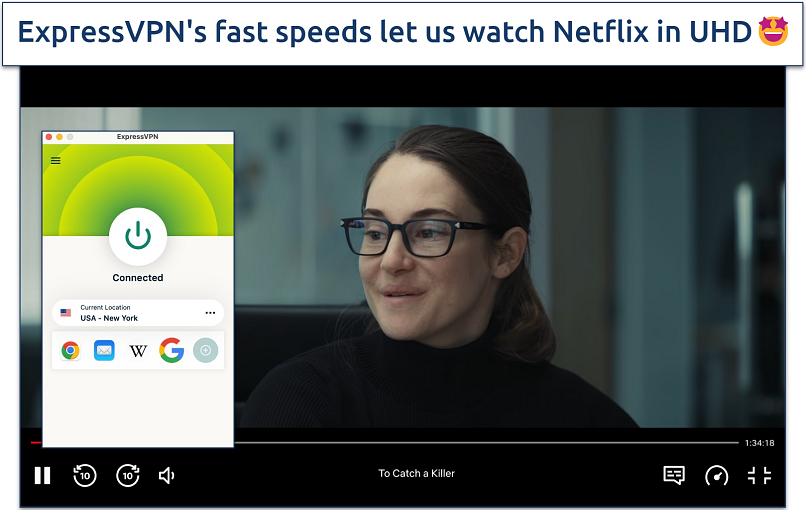 Its New York server gave us consistently fast speeds and stable connections
Its New York server gave us consistently fast speeds and stable connections
With its extensive server network, you'll always find a fast, uncrowded connection nearby. It uses 10 Gbps ports and offers automatic obfuscation, so you'll get great speeds even on restrictive networks that usually throttle VPN traffic. It also minimizes additional speed losses from VPN encryption in countries with strict internet controls, like Russia and China, which often have slow networks.
The only downside is that ExpressVPN costs more than other options. However, it offers frequent discounts throughout the year that make it much more affordable. Plus, you can try it risk-free since it’s backed by a 30-day money-back guarantee — if you're not satisfied with the speeds, getting a refund is easy.
Useful Features
- Low latency. ExpressVPN maintains consistently low ping times across its network, with rates under 30 ms on nearby servers. This makes it an excellent choice for gaming and other latency-sensitive activities. During our tests, we played Warzone on a PC and PUBG on an iPhone without any lag.
- P2P on all servers. ExpressVPN supports torrenting on every server at full speed, eliminating the need to search for specialized P2P locations. Simply connect to your nearest server and start downloading public domain content.
- Security without compromise. Advanced features like AES-256 encryption and IP/DNS leak protection are built-in, but they won't impact your connection speed. Plus, it has a strict no-logs policy and is based in the privacy-friendly British Virgin Islands.
- One of the fastest VPNs
- Works with top streaming sites
- A proven no-logs policy
- Limited customization
- Smart Location isn't always the fastest
2. NordVPN — NordLynx Offers WireGuard’s Fast Speeds With Improved Security
| Best Feature | NordLynx delivers fast speeds while sidestepping WireGuard’s privacy flaws |
|---|---|
| Speeds | Very fast — a 13% drop on nearby servers provides great speeds for streaming and torrenting |
| Server Network | 7,405 servers in 118 countries to minimize the chance of overcrowding |
| Works With | Netflix, Prime Video, BBC iPlayer, Max, Hulu, Vudu, DAZN, and more |
NordVPN takes second place with its custom-built NordLynx protocol. The protocol improves on WireGuard's foundation by fixing its privacy issues, keeping your connection both fast and secure. While it wasn’t always as consistent as our top pick, the difference was barely noticeable during regular use. NordVPN also offers OpenVPN, but it couldn't match NordLynx's speeds in any of our tests.
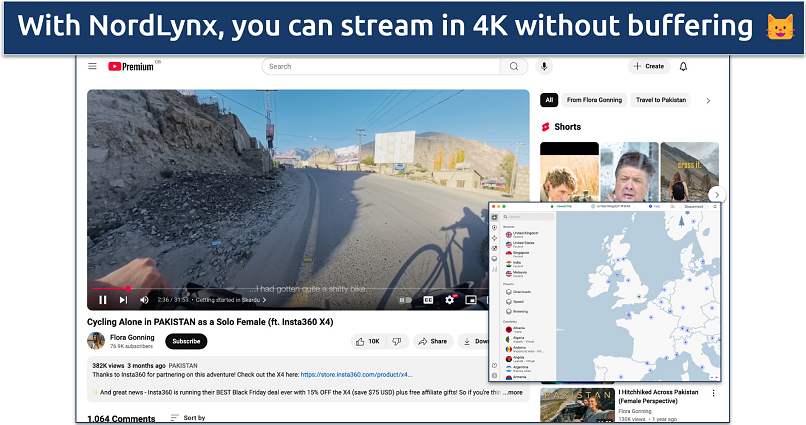 Using NordLynx, the speed drop was sometimes less than 15% even on servers that are over 5000 miles away
Using NordLynx, the speed drop was sometimes less than 15% even on servers that are over 5000 miles away
The performance was impressive on all NordVPN servers. For instance, our speeds only dropped by 11% on the Dallas server, and Miami connections slowed by just 8%. Long-distance performance stayed strong, too, with both London and Singapore servers retaining 79% of our base speed. There was no buffering even when we were streaming YouTube in HD.
The Presets feature on macOS lets you create custom server configurations for different activities. Instead of switching settings manually each time, you can save your preferred server and protocol combinations as profiles. For example, we set up a gaming preset with NordLynx and Miami servers for the lowest ping. This saved us time from constantly adjusting settings for different tasks.
My only problem with NordVPN is that you can’t use NordLynx on all devices. For instance, it’s not available on smart TVs, game consoles, or routers. But it is available for all other major OSs like Windows, Android, and iOS. You can test NordVPN risk-free with its 30-day money-back guarantee.
Useful Features
- Great for streaming. NordVPN's performance nearly matches ExpressVPN when it comes to streaming. During our tests, it worked well with Netflix, Disney+, BBC iPlayer, and other platforms without issues, so you can stream content in 4K from anywhere.
- Meshnet for gaming. This lets you create your own private gaming network with up to 60 devices and host virtual LAN parties with friends. You can play multiplayer games directly with your squad, bypassing laggy game servers.
- Advanced security. In addition to essential features, NordVPN’s Threat Protection blocks ads, trackers, and malicious websites, helping to keep you safe online. As an optional add-on, you can upgrade this to include a malware scanner and always-on functionality.
- Strong security and privacy
- Fast local and faraway servers
- Great for streaming
- Some long connection times
- High renewal prices
3. CyberGhost — Activity-Specific Servers to Find the Right Connection for Your Needs
| Best Feature | Optimized servers for high-speed gaming, streaming, and torrenting, so you never have to guess which server is the best for your needs |
|---|---|
| Speeds | Fast — a 22% drop on nearby servers lets you game and torrent without slowdowns |
| Server Network | 11,690 servers in 100 countries for reliable connections |
| Works With | Netflix, Prime Video, BBC iPlayer, Max, Hulu, Vudu, DAZN, and more |
CyberGhost takes the guesswork out of server selection with its optimized servers for different activities. In its main menu bar, you’ll find clearly labeled servers optimized for gaming, streaming, and torrenting. These are fine-tuned to deliver the best performance for each specific task. In our CyberGhost tests, these optimized connections consistently gave us better performance than regular ones.
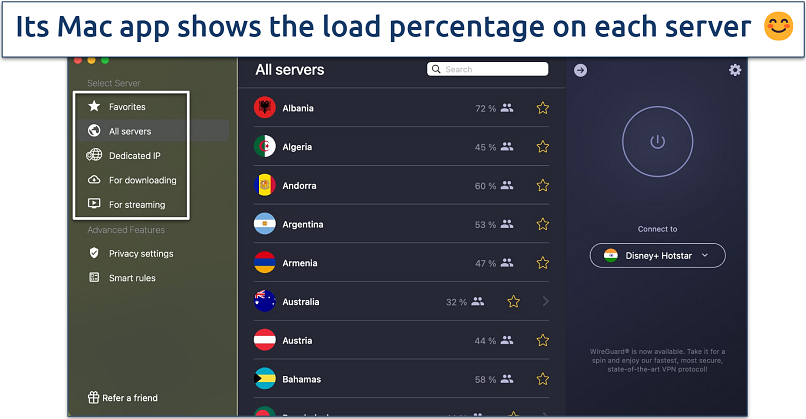 Lower server load typically means better speeds
Lower server load typically means better speeds
On its nearby US gaming server, we only saw a minimal 10% speed drop, and our ping only increased by 5 ms. Its torrenting server in Tokyo surprisingly increased our speed by 5%, letting us download at even faster speeds. Even its regular distant connections held up well, with most staying under a 35% speed loss. However, some distant servers saw higher-than-expected speed loss, such as 60% on its Australian server, which we didn’t experience with ExpressVPN.
CyberGhost doesn’t disappoint in terms of reliability, either. We tested 14 of its streaming-optimized servers, and each one worked flawlessly with its intended platform. Whether we were watching Netflix in 4K or live-streaming sports on DAZN, we never experienced buffering or quality drops.
I was a little disappointed that CyberGhost's monthly plan only comes with a shorter 14-day refund period, which doesn’t give you much time to test it. However, its long-term purchases include a more generous 45-day money-back guarantee, and they offer much better value starting at just $2.03/month.
Useful Features
- Dedicated IP addresses. For a small extra fee, you can get an IP that's exclusively yours. Since you're not sharing bandwidth with other users, you'll get faster, more consistent speeds. Plus, you'll avoid CAPTCHAs and keep stable access to banking sites since your IP won't get flagged from other users' activities.
- NoSpy servers. These servers are housed in Romania and managed directly by CyberGhost’s staff, keeping your data away from third parties. They use premium hardware for better speeds and come with extended bandwidth for consistent performance.
- Secure access to streaming
- Military-level security
- Designed for ease of use
- Slower long-distance servers
- Doesn't work in China
4. Proton VPN — VPN Accelerator to Boost Connection Speeds
| Best Feature | VPN Accelerator feature to enhance your speeds for any online activity |
|---|---|
| Speeds | Generally fast — an average 31% speed loss on nearby servers still provides stable speeds for fast loading times |
| Server Network | 12,061 servers in 117 countries provide plenty of connection options |
| Works With | Netflix, Prime Video, BBC iPlayer, Max, Hulu, Vudu, DAZN, and more |
Proton’s VPN Accelerator feature tackles the slowdowns that plague most VPNs on distant servers. It combines multiple optimizations to reduce strain on your device’s resources and improve connections, ensuring consistent speeds even over long distances.
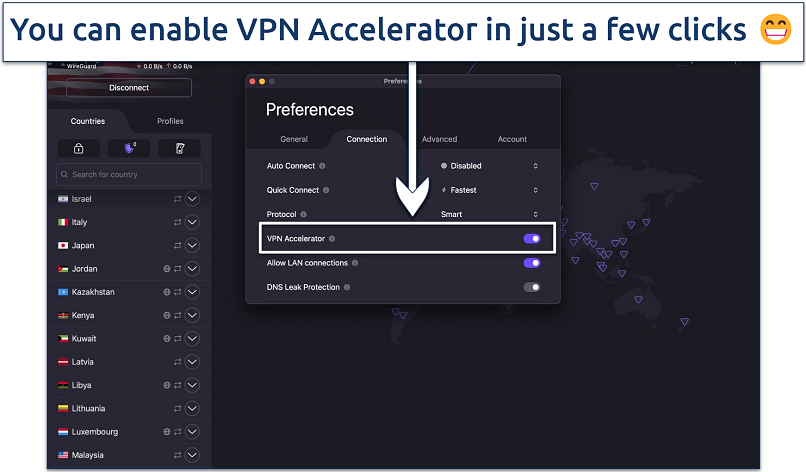 Proton VPN claims this feature can boost your speeds by up to 400% on some connections
Proton VPN claims this feature can boost your speeds by up to 400% on some connections
In our Proton tests, we saw minimal losses on specific servers with VPN Accelerator switched on (just 16% in New York and 11% in Tokyo), which is impressive. Some connections performed up to 30% better than they did without this feature. However, there were also a few outliers — the UK server slowed our speed by 73%. While that only happened on a select few servers, top picks like ExpressVPN and NordVPN didn’t see such drastic drops.
A minor downside is that Proton VPN tends to have higher latency overall. If your base ping is already high or you’re looking to play competitive games online, this may be a concern. However, for everyday browsing and streaming, you likely won’t notice a big difference.
You can test Proton VPN's performance for yourself with its 30-day money-back guarantee. The refund process is straightforward and doesn't require technical explanations. I requested a refund through its live chat and got my money back in a few days.
Useful Features
- Privacy-friendly. Proton VPN backs its privacy claims with open-source apps and regular audits. All servers run in RAM-only mode, while Secure Core routes your traffic through multiple servers in privacy-friendly countries. This can reduce your speeds, but it’s not a bad sacrifice when privacy is a must.
- Custom connection profiles. Create profiles tailored to your needs or use the pre-configured ones. The Fastest profile automatically picked nearby servers with the best speeds during our tests, and we could set up custom profiles for specific countries we frequently connected to.
- Advanced security features
- Good value
- Not all apps are equal
- No split tunneling for Mac
5. Surfshark — Unlimited Connections for Fast Speeds on All Your Devices
| Best Feature | Everyone in your household can enjoy fast, secure connections with no interruptions thanks to no device limits |
|---|---|
| Speeds | Fast — a 27% speed loss on nearby servers and low latency for gaming |
| Server Network | 3,200 servers in 100 countries to prevent lag from overcrowded connections |
| Works With | Netflix, Prime Video, BBC iPlayer, Max, Hulu, Vudu, DAZN, and more |
With Surfshark, you can connect unlimited devices simultaneously without slowdowns. We tested this by pushing it to the limit — streaming 4K Netflix on a MacBook, playing Warzone on a PC, downloading large files on a laptop, and browsing on several phones and tablets. Despite all these devices hogging bandwidth at once, our connection stayed strong with no buffering or lag.
Surfshark delivered solid results in our speed tests, with the nearby New York server cutting our baseline by 25%. Long-distance connections were relatively slower, with a 39% drop in Australia and 41% in Singapore (averaging around 34% overall). This is decent, but we've seen better from Surfshark before. ExpressVPN and NordVPN consistently outperformed it, with lower speed drops even on distant servers.
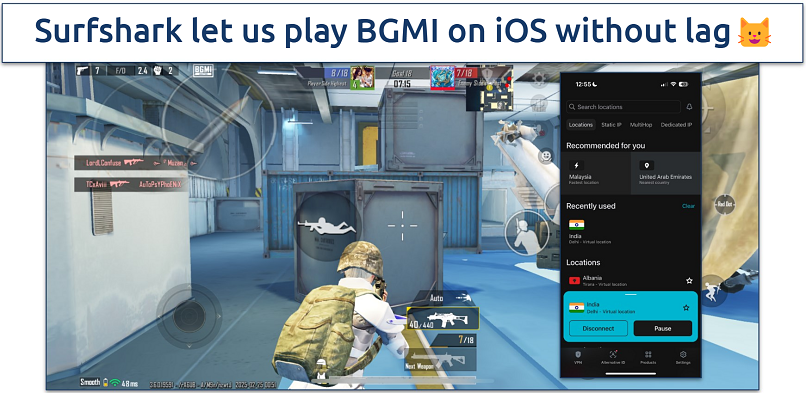 With unlimited connections, your whole family can game, stream, and browse simultaneously
With unlimited connections, your whole family can game, stream, and browse simultaneously
One minor annoyance is that some servers take longer to establish a connection. For example, our UK connection needed multiple attempts and took about 15 seconds to connect — whereas top providers typically connect within a second or two. However, once we established a connection, performance remained stable with no issues.
Its long-term subscriptions offer excellent value at just $1.99/month. You can test it risk-free with its 30-day money-back guarantee. Just ask for a refund if you’re not happy with the speeds.
Useful Features
- Speed test tool. Surfshark's Windows app includes a built-in speed test that checks upload speed, download speed, and latency on each server. This lets you find the best available server for your needs without ever having to leave the app. Unfortunately, it doesn’t work while you’re connected to a server.
- Advanced security. Beyond basic VPN protection, Surfshark includes CleanWeb to block ads and malware, plus MultiHop to route your traffic through two servers. The optional antivirus feature adds another layer of protection without impacting speeds.
- Easy to use
- Military-grade security
- Fast speeds
- Clunky torrenting support
- Based in a 9-Eyes country
- Might not work in China
More Fast VPNs We Tested
While testing VPNs for speed, we found several other providers that showed promising performance but didn't quite make our top 5. Here's what we found:
- Hotspot Shield. Its Hydra protocol aims to deliver fast speeds over long distances. Our tests showed only 19–29% speed loss across most locations, though speeds dropped significantly on some Asian servers. Plus, the performance was inconsistent and varied depending on the time of day.
- IPVanish. This VPN offers a user-friendly experience with straightforward apps. Some of its servers performed exceptionally well. For instance, our base speed improved by 3% on the Dallas server, but a few locations showed dramatic drops, like a 92% decrease in Australia.
- Private Internet Access (PIA). PIA has the largest server network we've tested, making it easy to find a nearby connection. Despite this advantage, speeds varied widely — from just 17% loss on long-distance Japan servers to over 70% drops on others.
- TunnelBear. This service features an intuitive world map interface for easy connections. Speed tests showed average performance with 28–48% losses on nearby servers, increasing to 60% on long-distance connections.
- PrivateVPN. It provides extensive customization options to optimize your connection for speeds. Speed losses averaged around 35–45% across most servers, which is decent but not competitive with our top 5 choices.
VPN Speed Test Results Compared
Editor's Note: We value our relationship with our readers, and we strive to earn your trust through transparency and integrity. We are in the same ownership group as some of the industry-leading products reviewed on this site: Intego, Cyberghost, ExpressVPN, and Private Internet Access. However, this does not affect our review process, as we adhere to a strict testing methodology.
Quick Comparison Table: Fastest VPN Features
The table below compares key features of the fastest VPNs, including local and long-distance speeds, connection stability, server networks, and the protocols they use to maintain high performance. These factors determine how well a VPN can handle activities like streaming, gaming, and downloading without slowdowns.
I’ve also included whether each VPN offers port forwarding. This feature allows your torrent client to connect directly with more peers, giving your seeds priority and significantly boosting both download and upload speeds.
Editor's Note: We value our relationship with our readers, and we strive to earn your trust through transparency and integrity. We are in the same ownership group as some of the industry-leading products reviewed on this site: Intego, Cyberghost, ExpressVPN, and Private Internet Access. However, this does not affect our review process, as we adhere to a strict testing methodology.
Our Methodology for Testing the Fastest VPNs
Raw speed numbers only tell part of the story when testing VPNs. We analyzed connection stability, consistency across different times of day, and performance during high-traffic periods. Each VPN underwent extensive testing across multiple locations, with special attention to speed retention on long-distance connections and performance during bandwidth-heavy tasks.
We also evaluated factors that impact real-world performance, such as the time needed to establish connections, server load distribution, and protocol options. In addition to this, we looked at security features, streaming capabilities, server networks, pricing, and other key factors. For a detailed breakdown of our testing process, check out our VPN testing methodology page.
Important Points to Keep in Mind Regarding VPN Speeds
Your VPN speeds depend on multiple factors, and understanding them helps you get the best performance. You won’t always get the same results that we got during our tests, though. Here's what affects your VPN speeds and why you might notice different results to ours:
- Base connection. A VPN’s speed is influenced by your original internet speed. If you start with 100 Mbps, expect VPN speeds below that, typically 70–90 Mbps with nearby servers. In this article, we only described the percentage drop we experienced as a rough estimate of the speeds to expect.
- Distance to a server. The closer you are to a VPN server, the faster your connection will be. A server in your city might only slow you down by 10%, while one across the globe could cut your base speed in half. Note that virtual servers can sometimes be slower than expected, considering their physical location isn’t the same as the IP location they provide.
- Server load and peak hours. Even the fastest VPN slows down when too many users connect to the same server. During peak hours (evening in local time), you might notice bigger speed drops.
- Security features. Advanced security features like double VPN or extra encryption layers will slow your connection. While modern protocols like WireGuard and Lightway maintain good speeds with high security, features like Multi-Hop can cut your speed by 50% or more.
- Connection stability. Your VPN connection will also be influenced by how stable your base connection is. A slightly slower but stable connection often works better than a faster but inconsistent one.
- Network routing. Each extra hop between you and your destination adds latency. Quality VPNs minimize this with optimized routing paths. However, the number of hops between us and our destination may vary between you and yours.
Quick Guide: How to Speed Test Your VPN in 3 Easy Steps
- Get a VPN.
I recommend ExpressVPN since its Lightway protocol offered the best speeds in our tests. Plus, it has a vast server network for reliable, speedy connections worldwide. - Check your starting speed.
Before connecting to your VPN, navigate to an online speed testing tool (like Ookla) to see what your base connection is. Take note of this number. - Connect to and test your VPN.
Choose a location from your VPN's server list to test — nearby servers will be the fastest. Then, run another speed test using the same tool. Compare your speeds with and without the VPN.
Editor's Note: Transparency is one of our core values at vpnMentor, so you should know we are in the same ownership group as ExpressVPN. However, this does not affect our review process.
How to Get Faster VPN Speeds
A VPN will naturally slow your connection due to encryption and the extra distance your data travels. But with the right setup, you can minimize this speed loss. Here are some simple ways to boost your VPN speeds:
- Pick the closest server. The further your data travels, the slower your connection gets. Unless you need a specific location, stick to the nearest possible server. Our tests consistently show 2–3 times faster speeds on local connections compared to distant ones.
- Use modern protocols. WireGuard, Lightway, and NordLynx are much faster than older options. If your VPN only offers OpenVPN, choose UDP instead of TCP — it's about 20% faster in most cases.
- Switch to Ethernet. WiFi is convenient, but it’s slower than a direct connection. In our tests, Ethernet connections were up to 30% faster when using a VPN. Plus, they're more stable for gaming and streaming.
- Check server load. A server at 80% capacity will be much slower than one at 20%. Some VPNs show this information in their app, so I recommend looking for servers under 50% load for the best speeds.
- Get a dedicated IP. Sharing an IP with other users can slow you down during peak hours. A dedicated IP usually costs a bit extra but gives you consistent VPN speeds since you're the only one using it.
- Enable split tunneling. Don't route all your traffic through the VPN if you don't need to. Let your local apps use your regular connection while only protecting sensitive activities with the VPN. This frees up bandwidth and can improve your speeds.
Advanced VPN Speed Hacks
- Change your encryption level. Stronger encryption (like 256-bit) provides better security but requires more processing time than lighter options (128-bit). Some VPNs, like PIA, let you adjust your encryption level, but this may not be available with every protocol.
- Set up port forwarding. This creates a direct connection to other users when torrenting, significantly boosting download speeds. Not all VPNs offer this, but it's worth using when available.
- Try different ports. Some networks throttle common VPN ports. Switching to port 443 (HTTPS) often helps bypass these restrictions since it's the same port used for regular web traffic, so it’s rarely restricted.
- Change your connection type. UDP connections are faster but less stable than TCP. Most VPNs default to UDP for better speeds, but some let you customize which transport protocol to use.
- Build your own VPN. Setting up a VPN server on a cloud platform gives you complete control over security and speed settings. It's more technical, but it can potentially deliver better performance because you’re the only one using it.
FAQs on the Fastest VPN Services
What affects a VPN’s speeds?
Your base connection, server location, and VPN settings all play crucial roles in determining your final VPN speed. While top VPNs minimize speed loss through optimized networks and protocols, your connection will still slow down as your traffic takes a longer route through VPN servers.
How can I improve my VPN connection for gaming and torrenting?
Gaming and torrenting have different VPN speed requirements. For gaming, low latency is crucial — even a slight delay can make the difference between winning and losing. Connect to servers close to your location or the game servers, and always choose VPNs that offer fast protocols. A wired connection and servers with low load will also help reduce lag and packet loss.
For torrenting, focus on maximizing bandwidth rather than reducing latency. Look for P2P-optimized servers, which are specifically configured for better torrenting performance. If your VPN offers port forwarding, enable it. This creates direct connections to more peers and can significantly boost download speeds. Some VPNs also support SOCKS5 proxy, which is lighter than full VPN encryption and can improve torrenting speeds.
Which VPN protocol is the fastest?
In our experience, Lightway is the fastest protocol. But if you’re looking for a non-proprietary option, then WireGuard is your best bet. As a runner-up, OpenVPN produces decent speeds while providing strong security (but only with UDP). On the other hand, PPTP and L2TP are older protocols that offer fast speeds but at the cost of reduced security.
Is Surfshark faster than NordVPN?
NordVPN was faster than Surfshark across nearly all our test locations. Its NordLynx protocol delivered better speeds across a variety of servers. Surfshark isn't slow by any means — it handles 4K streaming and gaming without issues on nearby servers. However, NordVPN's performance puts it firmly ahead in the speed department.
Will a VPN speed up my internet connection?
Generally, no — a good VPN will slightly slow down your connection due to encryption and the extra distance your data travels. A fast VPN will keep the speed loss to a minimum, though.
However, there are some situations where a VPN might actually improve your speeds. If your internet provider throttles specific services like Netflix or torrent traffic, a VPN can bypass these restrictions and restore your speeds. Similarly, if your ISP uses inefficient routing to certain websites, a VPN might provide a faster path to reach them.
Just keep in mind that a VPN usually can’t exceed the base speed you get from your internet provider. If you're experiencing slow internet, it's more likely due to your ISP or home network setup than something a VPN can fix.
What is the fastest VPN for Android and Firestick?
The #1 VPN on this list is currently the fastest VPN for both Android and Firestick. Its Lightway protocol keeps speeds consistently high. Plus, it offers native apps for Android and Fire TV devices, making it super easy to set up and use.
What’s the fastest free VPN?
We tested dozens of free VPNs, but none came close to matching the speeds of premium services. Instead of hunting for a fast, free VPN, we recommend trying one of the VPNs on this list. They all offer money-back guarantees, and some even have free trials or plans, letting you test them risk-free.
Free VPNs are typically slow for several reasons. They have fewer servers that get quickly overcrowded, and they often cap your speeds and data to push you toward paid plans. Many also lack modern protocols like WireGuard that help maintain fast connections.
Plus, free VPNs pose serious privacy risks — many sell user data or inject ads to cover their costs, and some even contain malware. Some free VPNs have also been caught selling user bandwidth to third parties, turning users' devices into exit nodes.
Get the Fastest VPN
With so many VPNs claiming to be the fastest, it takes a lot of testing to determine which truly are. Still, my team and I wanted to get to the bottom of it, so we took the time to do the testing ourselves. The VPNs that made it to my shortlist gave us top speeds by offering fast protocols, large server networks, and intuitive features.
From these, ExpressVPN is the fastest VPN we’ve tested. It offers its own Lightway protocol and a huge network of consistently fast servers that give you reliable connections. This means you can enjoy HD streaming from anywhere, uninterrupted browsing, lag-free gaming, and quick torrenting. Plus, it comes with a 30-day money-back guarantee, so you can test ExpressVPN’s speeds risk-free. If you’re not satisfied, it’s easy to claim a refund.
To summarize, the fastest VPNs in 2025 are...
Editor's Note: We value our relationship with our readers, and we strive to earn your trust through transparency and integrity. We are in the same ownership group as some of the industry-leading products reviewed on this site: Intego, Cyberghost, ExpressVPN, and Private Internet Access. However, this does not affect our review process, as we adhere to a strict testing methodology.
Your data is exposed to the websites you visit!
Your IP Address:
3.145.3.247
Your Location:
US, Ohio, Columbus
Your Internet Provider:
The information above can be used to track you, target you for ads, and monitor what you do online.
VPNs can help you hide this information from websites so that you are protected at all times. We recommend ExpressVPN — the #1 VPN out of over 350 providers we've tested. It has military-grade encryption and privacy features that will ensure your digital security, plus — it's currently offering 61% off. Editor's Note: ExpressVPN and this site are in the same ownership group.
Leave a comment
I did my own testing 2 times each one and expressvpn dedicated ip was the fastest and expressvpn shared was 2nd and nordvpn shared was 3rd and last place was nordvpn dedicated ip!
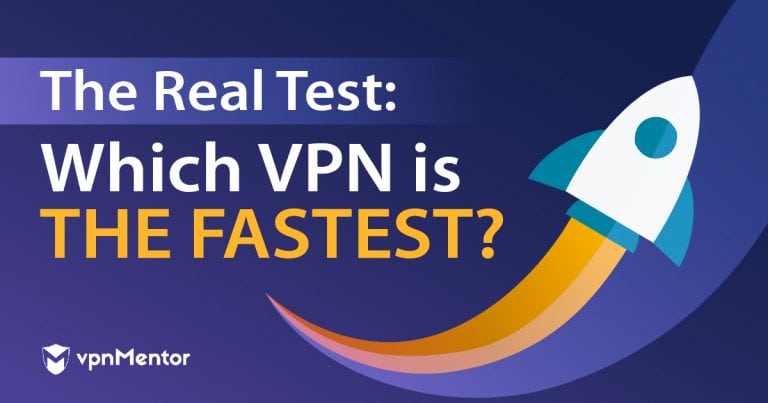



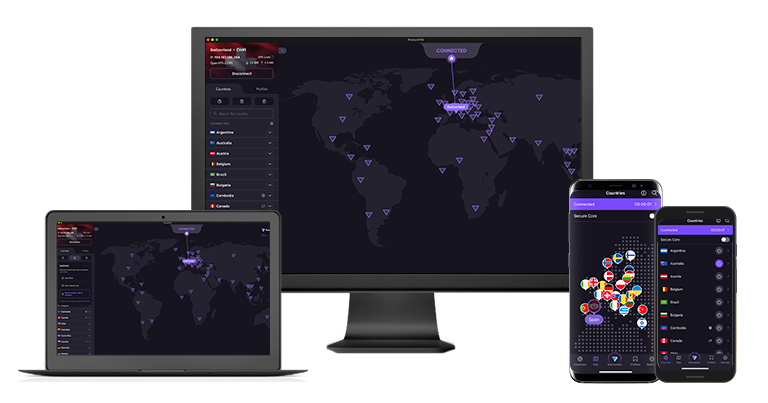


Please, comment on how to improve this article. Your feedback matters!